 Euroscepticism is far stronger in other areas of the UK, especially in areas of England, than it is in London. London’s economy, population and politics offer immediate reasons for this more comfortable view of the EU. The views held by Londoners of the EU should remind us that labelling the UK, or England, as ‘Eurosceptic’ overlooks how views of the EU vary across them both, writes Tim Oliver.
Euroscepticism is far stronger in other areas of the UK, especially in areas of England, than it is in London. London’s economy, population and politics offer immediate reasons for this more comfortable view of the EU. The views held by Londoners of the EU should remind us that labelling the UK, or England, as ‘Eurosceptic’ overlooks how views of the EU vary across them both, writes Tim Oliver.
Londoners view the EU more positively than most other people in the UK. Despite this ‘London’ often becomes short-hand for a veto wielding UK government, Eurosceptic backbenchers, English Euroscepticism or more broadly a Britain that can be an awkward partner for the rest of the EU. To some extent this is understandable given London’s dominant position in the UK. However, we should be careful not to overlook the opinions of the more than 8.5 million people that make up the UK’s biggest city and region, the home of Britain’s most diverse and international population, the heart of the British economy, the centre of UK politics and culture, and the EU’s biggest city.
UKIP has generally performed below average in votes to elect London’s MEPs. In the 2009 European Parliament elections UKIP in London received its second lowest share (10.8%) of the vote of any region in Great Britain, its lowest being in Scotland (5.2%). In the forthcoming European Parliament elections UKIP’s share of London’s vote looks set to go up, but this looks likely to happen across Great Britain including in Scotland.
If Londoners remain consistent with polling data then UKIP’s share of London’s vote will remain below their national average. This should not be a surprise. The British Election Study Continuous Monitoring Survey shows 58.6% of Londoners overall approve of Britain’s membership of the EU. London is just beaten into second place by Scotland where 59.1% overall approve, although London is home to the largest group who ‘strongly approve’ of EU membership. These compare to a UK average of 49.2% overall approving of EU membership, and 46.4% when calculated for areas of England outside London. With 41.4% of Londoners overall disapproving there can be no denying that Londoners still show a strong degree of Euroscepticism, but Euroscepticism is much stronger in other areas of the UK, and especially other areas of England. On views of the EU Londoners are closer to the Scots.
Table 1: “Overall, do you strongly approve, approve, disapprove, or strongly disapprove of Britain’s membership in the European Union?”
Note: The data were provided by Dr Ben Clements and come from the British Election Study Continuous Monitoring Survey (BES CMS), based on the pooled June 2005-December 2012 monthly cross-sectional surveys (weighted data). The BES CMS dataset was obtained from the main BES 2009/10 project website.
London’s European World
London’s economy, population and politics offer immediate reasons for this more comfortable view of the EU. London has long been one of Europe’s leading centres for trade and commerce. Today, a large part of the material wealth of London is tied to the economic vibrancy of the wider European market as part of a wider global market. Britain might not be in the Euro, but that does not stop London handling more euro foreign-exchanges than the Eurozone combined. Nor does it stop London being the headquarters of one hundred of Europe’s top 500 companies. Companies such as Goldman Sachs and the Lord Mayor of London have warned of the cost to London and the UK of an exit from the EU.

(Credit: David Holt London CC BY 2.0)
The economic links also reflect a population of which 36.7% (according to the 2011 census) come from outside the UK. About 10.3% come from elsewhere in the EU, a figure that excludes the large numbers of short-term visitors who visit to work or study for several months. Such is the appeal of London, especially to young Europeans, that in 2007 and 2012 candidates for the French presidency campaigned in London in order to reach the large number of French voters there.
Nor is this a new development. London has long faced large numbers of people arriving from overseas. The arrival of new immigrants that has helped drive Euroscepticism elsewhere in the UK is not unusual for London. As home to the UK’s largest ethnic minority communities, Londoners have long grappled with the politics of immigration and racial politics. This is not to argue it has passed unnoticed. But issues such as London’s insanely high house and rental prices and growing inequality are just as likely to be blamed on the arrival of – and London’s attempts to attract – wealthy Russians or citizens from Middle Eastern states as on immigrants from Eastern Europe.
This heterogeneous population gives London a unique identity politics. Contrary to what some may think, the 2011 census showed that more Londoners identify themselves as British than in any other region of Great Britain. This should come as no surprise given London is the home of the British monarchy, government and other institutions such as the British Museum and the BBC. Black and ethnic minority groups are also more likely to identify with being British than English, and they constitute a large proportion of London’s population. This stronger attachment to British identity matters because as an IPPR report into English identity found, there is clear evidence that people who identify themselves as British tend to be less Eurosceptic than those who identify themselves as English.
London’s own numerous political institutions – its mayor, Greater London Assembly, the ‘City of London’ and its Lord Mayor, along with its intimate connections with British government in Whitehall and Westminster – provides it with more political autonomy and representation, in both the UK and the EU, than any other area of England. The EU does not appear as remote and uncontrollable as it might in other areas of the UK. There could be no clearer example than David Cameron wielding a UK veto to defend the financial interests of institutions based largely in London. This is not to deny the EU can challenge London, especially on the financial workings of the City of London. If this were to grow then Londoners support for the EU could take a big hit.
London’s own political institutions also leave it more comfortable with the current constitutional status quo of the UK. As the IPPR noted, the link between Englishness and Euroscepticism is important because, “the stronger a person’s sense of English identity, the more likely they were to be dissatisfied with the place of England within the post-devolution United Kingdom.” This is not to argue Londoners are entirely happy. But a combination of unease about England’s place in the UK and membership of the EU is not something Londoners appear to feel as powerfully. People elsewhere in England are not only increasingly sceptical of the EU, but also of a UK which is perceived to be biased towards areas such as Scotland and London.
Finally, London’s internationalism defines it, perhaps even more so than Europe. London’s economy, its population (a larger proportion of Londoners come from Asia than the rest of the EU), its identity, and its politics are all shaped by its global outlook. As a world city it measures itself not simply by its place in the UK or the EU, but against cities such as New York, Tokyo or Dubai. Britain may no longer be the centre of a global empire, but London still sees itself – with some justification – as one of the centres of world business, culture and politics.
London and an in-out referendum
Given Londoners views of the EU they are unsurprisingly amongst the least likely to support a UK withdrawal from the EU. London will play a crucial part in any renegotiation and referendum campaign. If David Cameron were to get his way – admittedly a big ‘if’ – and seek a renegotiation after the 2015 general election, then most predictions put a referendum in 2017. This means the issue could play into the 2016 election for the London Assembly and mayor. London’s leading business figures, along with the UK media and political elite based in London, will also play a central role in any referendum debate.
London will also shape developments after a referendum, especially if the rest of England were to vote for withdrawal leaving London on the losing side. The possibility of Scotland finding itself on the losing side has prompted warnings that “If the UK leaves the EU, Scotland leaves the UK.” A large number of Londoners and their business and political leaders would likely feel equally aggrieved at being torn from the EU against their wishes. It would counter some claims Scotland was being unfairly treated. Nevertheless, as in Scotland, it would fuel a sense of grievance that the rest of the UK holds London back. Existing demands that London be granted greater autonomy could rise up the agenda. It would create a situation where London finds itself as the multicultural globalised capital city of a fragmenting multinational UK and a Eurosceptic England.

The Many European Faces of London and the UK
The views held by Londoners of the EU should remind us that labelling the UK, or England, as ‘Eurosceptic’ overlooks how views of the EU vary across them both. Clearly the UK is home to some of the strongest Eurosceptic opinions in the EU. But when understanding any political belief, movement or idea, it is important to note that this is not a single, coherent attitude. Similarly it is important to examine more closely if people are sceptical or supportive of political union or economic and trading links. Understanding attitudes to the EU therefore requires a more nuanced view than blanket UK or England-wide views. Given the structure of the UK it is also easy to create a false dichotomy of a Eurosceptic-English-black to a pro-European-Scottish-white. Not only does this overlook variation within England, but also overlooks the Euroscepticism found across the UK.
London itself is home to a range of views on the EU. Given the strength of Eurosceptic opinion in the South East and East of England, the regions that surround London, it might be that Euroscepticism increases with distance from the centre of London. Generally, however, opinion in London is noticeably different to the rest of the UK and especially England, in that it is less Eurosceptic. No single factor explains this. It is down to a combination of factors such as London’s large EU and foreign-born population, a more British and less English identity, its strong economic connections with the EU, an international outlook, and the ability of London’s political actors to influence the EU through the British government or on its own.
Note: This article gives the views of the author, and not the position of the British Politics and Policy blog, nor of the London School of Economics. Please read our comments policy before posting.
About the Author
 Tim Oliver is a Fritz Thyssen Transatlantic Post-Doctoral Fellow for International Relations and Security (TAPIR) at the Center for Transatlantic Relations at the Johns Hopkins University Paul H. Nitze School of Advanced International Studies, Washington D.C. Educated at the University of Liverpool and the London School of Economics, he has worked in the European Parliament, the House of Lords, and taught at UCL, LSE and as a senior lecturer at the Royal Military Academy Sandhurst.
Tim Oliver is a Fritz Thyssen Transatlantic Post-Doctoral Fellow for International Relations and Security (TAPIR) at the Center for Transatlantic Relations at the Johns Hopkins University Paul H. Nitze School of Advanced International Studies, Washington D.C. Educated at the University of Liverpool and the London School of Economics, he has worked in the European Parliament, the House of Lords, and taught at UCL, LSE and as a senior lecturer at the Royal Military Academy Sandhurst.








That’s because there are very few REAL Londoners left, most of us gave up on the place when it stopped resembling the place we grew up in. London is populated by the rich and the foreign.
And exactly who are ‘REAL Londoners’? London has always had a strong international population, whether drawn from across the empire (India, Pakistan, Caribbean, South Africans, Australians, New Zealanders, Chinese), Europe (Jews, Dutch, French, Germans, Russians, Poles, Italians) or the British Isles (are London Irish, London Scots or people who move to London from the north of England or places like Devon (like my family) ‘REAL Londoners’?). Nobody can deny the rate of people moving to London has increased in the last twenty years (during which London’s post-war decline in population has been dramatically reversed), but even in the 1970s around 20% of Londoners had been born overseas.